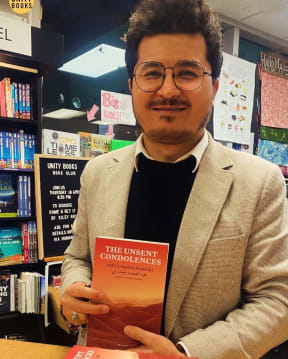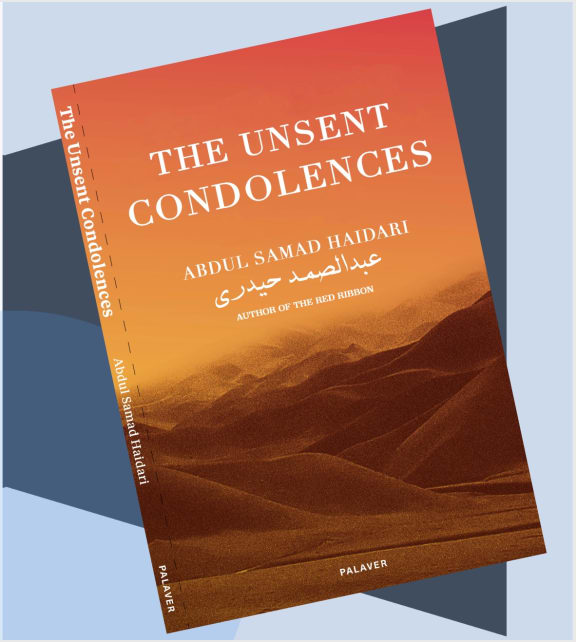
Abdul Samad Haidari Photo: supplied
Pōneke-based poet and journalist Abdul Samad Haidari became a refugee at the age of 10.
Poetry has been a way for him to cope with the trauma and to turn it into empowerment. His second book of poetry The Unsent Condolences was launched recently at Unity Books in Pōneke Wellington.
Haidari lost his sister in the Taliban's bombings of their home in Afghanistan's Ghazni province in the late 1990s. But the terror did not end there. Separated from his family aged 11, he worked as a child labourer on Iranian construction sites, observing torture in the detention camps.
Returning to his homeland as an adult, he worked to highlight human rights issues as a journalist, but faced assassination attempts. He also suffered the loss of his father and his brother-in-law as a result.
Haidari sought asylum and spent nine years trapped in Indonesia as a refugee, before being granted residency on humanitarian grounds in Aotearoa New Zealand in February 2023.
Aotearoa presented Haidari with a new start, but it started in emergency housing that was reported for its terrible conditions.
Things were better now, Haidari said, and it was poetry, alongside his work in human rights and with other refugees, that provided solace.
Published by Palaver in Australia, The Unsent Condolences was written in Indonesia following Haidari's first book, Red Ribbon, in 2019. It was the first book in that country to be published by a refugee and became a best-seller.
The red ribbon of the title was his sister's. He untied it from her hair as she lay dead.
Haidari described his years as a refugee in Indonesia as a "dark point of time" when he had "no rights to anything".
He said the poetry he wrote during those years gave him something useful to do, and he viewed it as a continuation of his journalism.
"I picked up the pen and the pen helped me forming these rhymes."
In the prologue to The Unsent Condolences Haidari wrote that it:
"is not a collection of poems
but part so me -
is not just words
collated in a quilt of rhymes
but a jar full of fresh scars."
Haidari said for him, poetry was both a way of dealing with trauma but also a source for change; an act of resistance and a way to reclaim dignity for himself and the thousands of refugees who had silently endured loss.

Photo: supplied
Becoming a refugee was a process that took so much from people, he said, but it also made them very strong.
"Your identity is questioned, your religious beliefs are questioned, your status is questioned ... everything is questioned and that really puts you in a different category."
The term refugee was "almost a nationality for itself", he said.
While it was not easy to write about his "difficult memories", Haidari believed it was important to tell the stories of the Hazara community.
In the poem 'Troops of rented boars' in his new book he wrote: "I survived the genocide but how should I survive the traumas?"
Poetry was part of the answer.
Art - of any sort - could help people deal with difficult experiences, he said.
But he believed community was the most important thing for people who had been through traumatic experiences: "The community where you are living, how the community treats you."
Haidari recalled literature and poetry being part of his life from an early age, when he would sit under a blanket in winter, listening to his grandmother - "the most amazing storyteller I have ever come across" - tell stories by lantern-light for hours.
"Afghanistan is the land of literature and the land of poetry and the land of love," he said, "but things have changed with the passage of time."
Sharing his grandmother's and other family members' stories with a wider audience was now a driving force for Haidari, he said.
"I have a lot of projects to write, a lot of stories to tell."

